Unit 2 Good habit(Grammar -Fun time)课件(24张PPT)
文档属性
| 名称 | Unit 2 Good habit(Grammar -Fun time)课件(24张PPT) |  | |
| 格式 | pptx | ||
| 文件大小 | 6.4MB | ||
| 资源类型 | 教案 | ||
| 版本资源 | 牛津译林版 | ||
| 科目 | 英语 | ||
| 更新时间 | 2021-05-18 12:27:07 | ||
图片预览


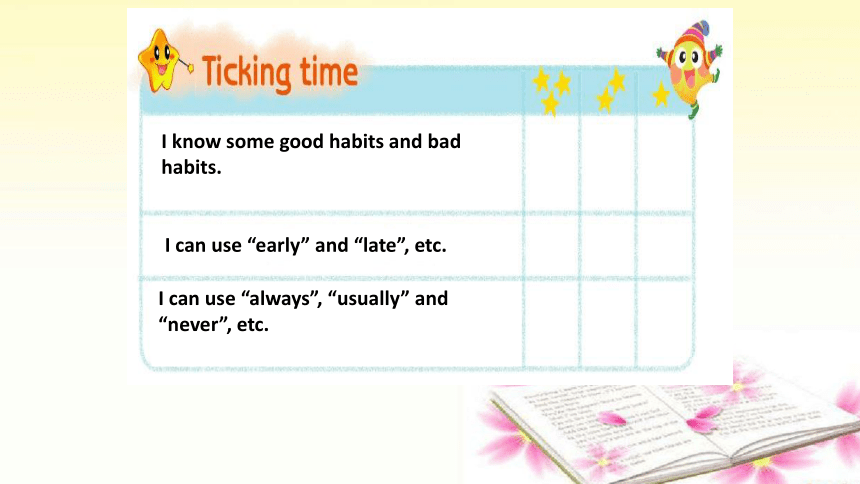
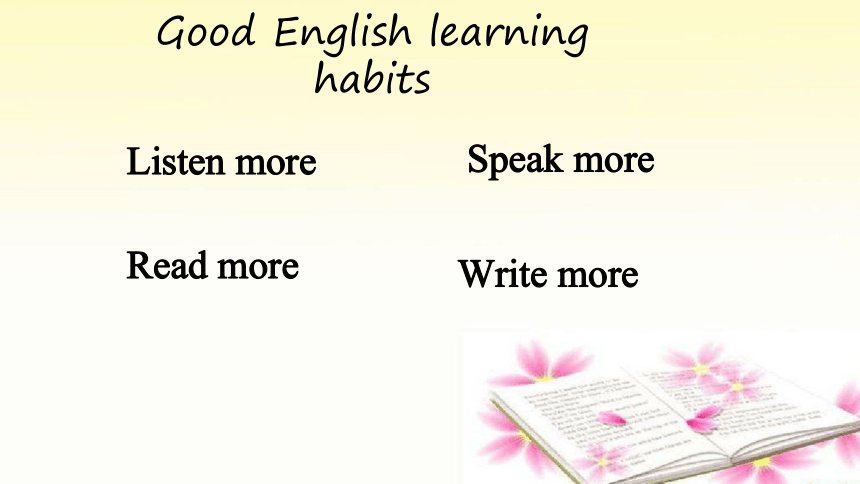
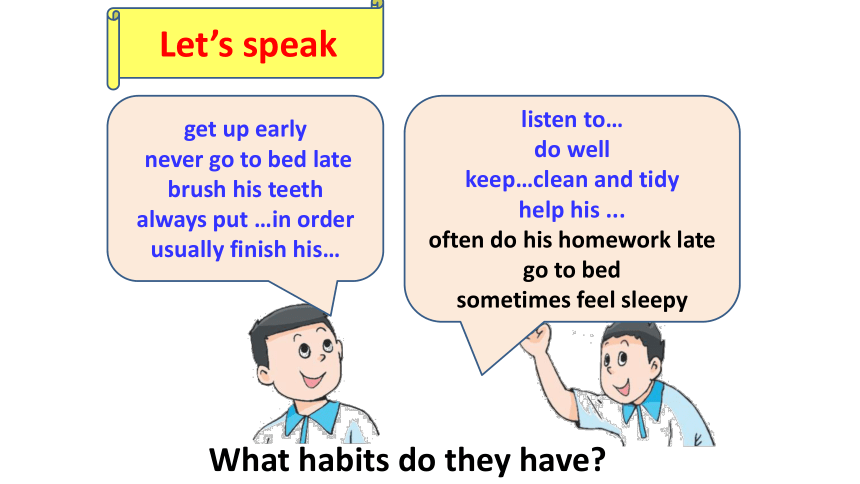
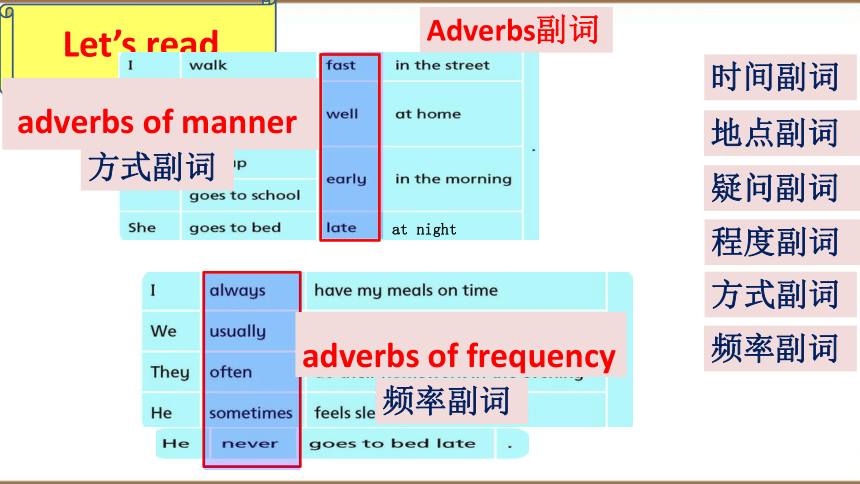
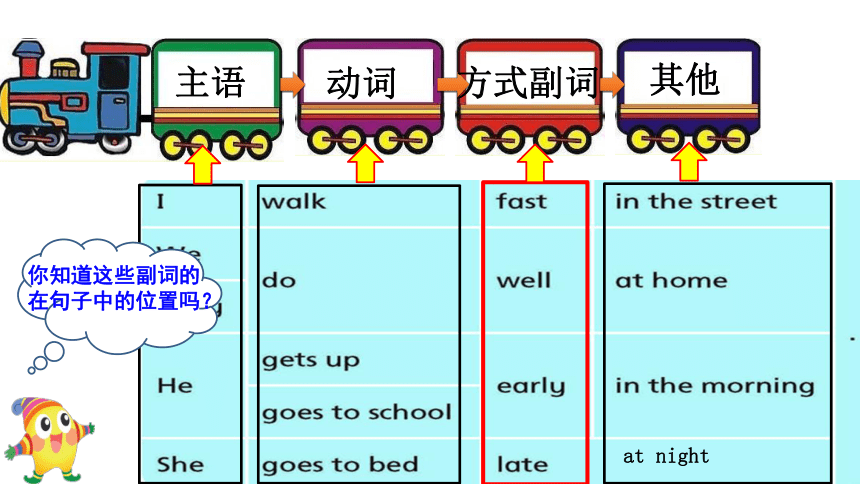
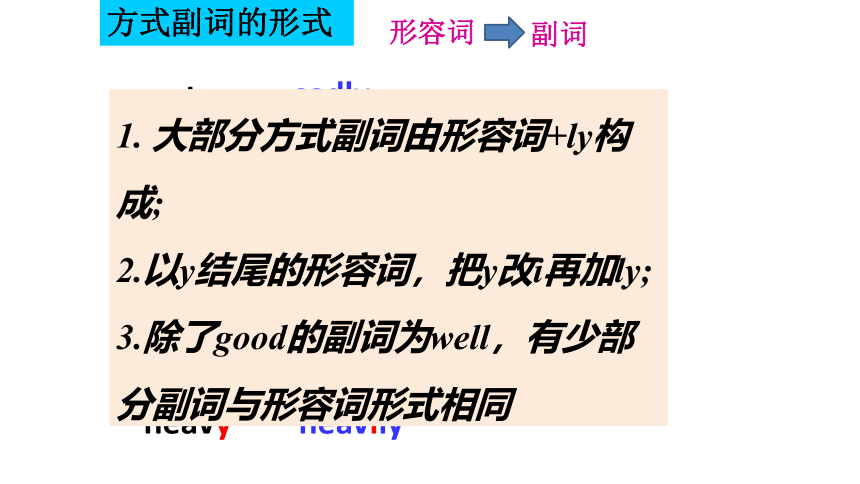
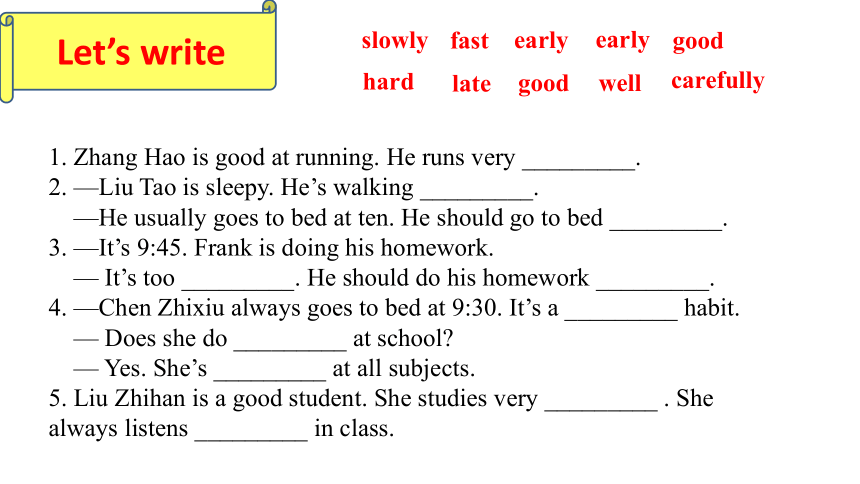
文档简介
Good habits
Successful people form the habits of success very early.
成功的人很早就养成成功的习惯。
Unit 2 Good habits
(Grammar time & Fun time)
I can use “early” and “late”, etc.
I can use “always”, “usually” and “never”, etc.
I know some good habits and bad habits.
Good English learning habits
Listen more
Speak more
Read more
Write more
What habits do they have?
listen to…
do well
keep…clean and tidy
help his ...
often do his homework late
go to bed
sometimes feel sleepy
get up early
never go to bed late
brush his teeth
always put …in order
usually finish his…
Let’s speak
Let’s read
at night
时间副词
地点副词
疑问副词
程度副词
方式副词
频率副词
Adverbs副词
adverbs of frequency
频率副词
adverbs of manner
方式副词
at night
主语
动词
方式副词
其他
你知道这些副词的在句子中的位置吗?
sad
loud
quiet
happy
angry
easy
heavy
good
fast
early
late
方式副词的形式
形容词
副词
sadly
loudly
quietly
happily
angrily
easily
heavily
late
early
fast
well
1. 大部分方式副词由形容词+ly构成;
2.以y结尾的形容词,把y改i再加ly;
3.除了good的副词为well,有少部分副词与形容词形式相同
Let’s write
1. Zhang Hao is good at running. He runs very _________.
2. —Liu Tao is sleepy. He’s walking _________.
—He usually goes to bed at ten. He should go to bed _________.
3. —It’s 9:45. Frank is doing his homework.
— It’s too _________. He should do his homework _________.
4. —Chen Zhixiu always goes to bed at 9:30. It’s a _________ habit.
— Does she do _________ at school?
— Yes. She’s _________ at all subjects.
5. Liu Zhihan is a good student. She studies very _________ . She always listens _________ in class.
hard
slowly
fast
carefully
late
early
good
well
good
early
go to bed early
go to bed late
sleep deeply
sleep well
头脑风暴:根据图片说出尽可能多的动副词组
Let’s speak
…
…
…
…
…
…
…
…
…
Pick and say
Pick one!
OK.
Do you go to bed early?
Yes, I do.
Thank you!
That’s a good habit.
Let’s speak
你知道频率副词在句子中的位置吗?
频率副词在句中位置
I am usually at home on Sundays.
We must always get to school on time.
He doesn’t often play football.
She always works hard.
We often play basketball together.
He never goes to bed late.
He sometimes feels sleepy in the morning.
通常放在行为动词的前面
放在be动词、情态动词、
助动词的后面
sometimes可放在句首、句中或句末。
e.g. 她有时看电视。
Sometimes she watches TV.
She sometimes watches TV.
She watches TV sometimes.
always
usually
often
sometimes
seldom
never
100%
总是
75%?
通常
60%
经常
40%
有时
15%
很少
0
从不
I
She
Helen
My father
His sister
We
They
My parents
…
get up
go to bed
finish one’s homework
play football
listen to teachers
jump
do …at school
laugh
write
walk
work
…
always
usually
often
sometimes
seldom
never
…
early
late
well
carefully
far
badly
happily
quietly
fast
hard
…
Let’s speak
Who?
He is a good teacher. He teaches______.
He ________ comes to school _____. He ________ talks to children about life and study. He seldom (很少) gets angry with children.
He ________ has a lot of things to do every day. He ___________ goes home very_____. He _____ feels tired.
Let’s listen
Listen and fill.
always
often
usually
sometimes
never
well
early
late
Tip 3:使用方式副词和频度副词;
Tip 1:介绍他的好习惯和坏习惯;
Tip 2:介绍他的生活习惯和学习习惯;
China Dream
国家富强 民族振兴 人民幸福
The power of habit《习惯的力量》
Mini habits《微习惯》
How to form good habits?
Let’s read
I can use “early” and “late”, etc.
I can use “always”, “usually” and “never”, etc.
I know some good habits and bad habits.
√
√
√
Homework:
Write a passage about the habits of your classmate’s or your parent’s.
写一写你同学的好习惯。
Read a book about habits and try to follow the advices.
读一本关于习惯的书并照着建议去做。
Successful people form the habits of success very early.
成功的人很早就养成成功的习惯。
Unit 2 Good habits
(Grammar time & Fun time)
I can use “early” and “late”, etc.
I can use “always”, “usually” and “never”, etc.
I know some good habits and bad habits.
Good English learning habits
Listen more
Speak more
Read more
Write more
What habits do they have?
listen to…
do well
keep…clean and tidy
help his ...
often do his homework late
go to bed
sometimes feel sleepy
get up early
never go to bed late
brush his teeth
always put …in order
usually finish his…
Let’s speak
Let’s read
at night
时间副词
地点副词
疑问副词
程度副词
方式副词
频率副词
Adverbs副词
adverbs of frequency
频率副词
adverbs of manner
方式副词
at night
主语
动词
方式副词
其他
你知道这些副词的在句子中的位置吗?
sad
loud
quiet
happy
angry
easy
heavy
good
fast
early
late
方式副词的形式
形容词
副词
sadly
loudly
quietly
happily
angrily
easily
heavily
late
early
fast
well
1. 大部分方式副词由形容词+ly构成;
2.以y结尾的形容词,把y改i再加ly;
3.除了good的副词为well,有少部分副词与形容词形式相同
Let’s write
1. Zhang Hao is good at running. He runs very _________.
2. —Liu Tao is sleepy. He’s walking _________.
—He usually goes to bed at ten. He should go to bed _________.
3. —It’s 9:45. Frank is doing his homework.
— It’s too _________. He should do his homework _________.
4. —Chen Zhixiu always goes to bed at 9:30. It’s a _________ habit.
— Does she do _________ at school?
— Yes. She’s _________ at all subjects.
5. Liu Zhihan is a good student. She studies very _________ . She always listens _________ in class.
hard
slowly
fast
carefully
late
early
good
well
good
early
go to bed early
go to bed late
sleep deeply
sleep well
头脑风暴:根据图片说出尽可能多的动副词组
Let’s speak
…
…
…
…
…
…
…
…
…
Pick and say
Pick one!
OK.
Do you go to bed early?
Yes, I do.
Thank you!
That’s a good habit.
Let’s speak
你知道频率副词在句子中的位置吗?
频率副词在句中位置
I am usually at home on Sundays.
We must always get to school on time.
He doesn’t often play football.
She always works hard.
We often play basketball together.
He never goes to bed late.
He sometimes feels sleepy in the morning.
通常放在行为动词的前面
放在be动词、情态动词、
助动词的后面
sometimes可放在句首、句中或句末。
e.g. 她有时看电视。
Sometimes she watches TV.
She sometimes watches TV.
She watches TV sometimes.
always
usually
often
sometimes
seldom
never
100%
总是
75%?
通常
60%
经常
40%
有时
15%
很少
0
从不
I
She
Helen
My father
His sister
We
They
My parents
…
get up
go to bed
finish one’s homework
play football
listen to teachers
jump
do …at school
laugh
write
walk
work
…
always
usually
often
sometimes
seldom
never
…
early
late
well
carefully
far
badly
happily
quietly
fast
hard
…
Let’s speak
Who?
He is a good teacher. He teaches______.
He ________ comes to school _____. He ________ talks to children about life and study. He seldom (很少) gets angry with children.
He ________ has a lot of things to do every day. He ___________ goes home very_____. He _____ feels tired.
Let’s listen
Listen and fill.
always
often
usually
sometimes
never
well
early
late
Tip 3:使用方式副词和频度副词;
Tip 1:介绍他的好习惯和坏习惯;
Tip 2:介绍他的生活习惯和学习习惯;
China Dream
国家富强 民族振兴 人民幸福
The power of habit《习惯的力量》
Mini habits《微习惯》
How to form good habits?
Let’s read
I can use “early” and “late”, etc.
I can use “always”, “usually” and “never”, etc.
I know some good habits and bad habits.
√
√
√
Homework:
Write a passage about the habits of your classmate’s or your parent’s.
写一写你同学的好习惯。
Read a book about habits and try to follow the advices.
读一本关于习惯的书并照着建议去做。
